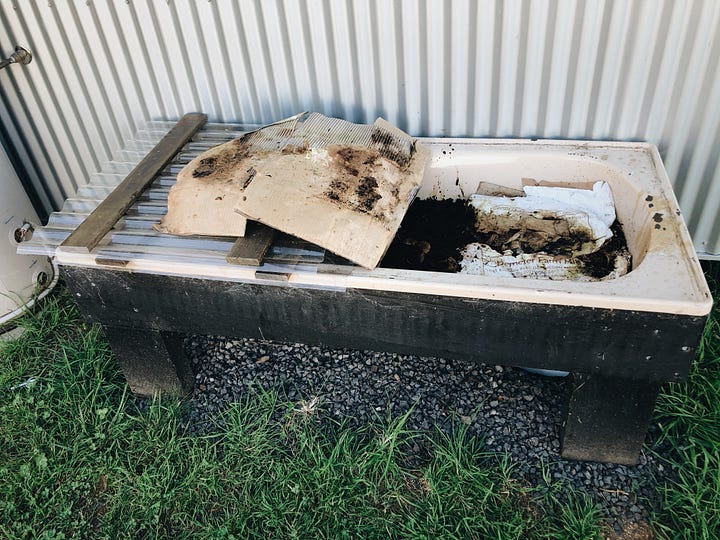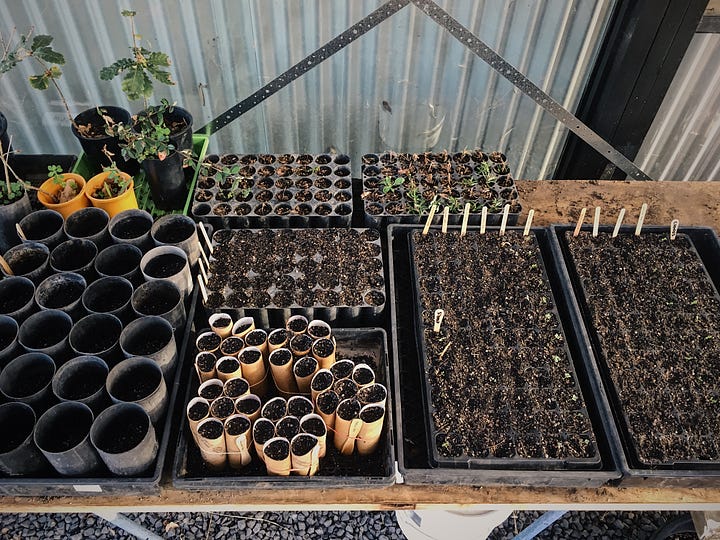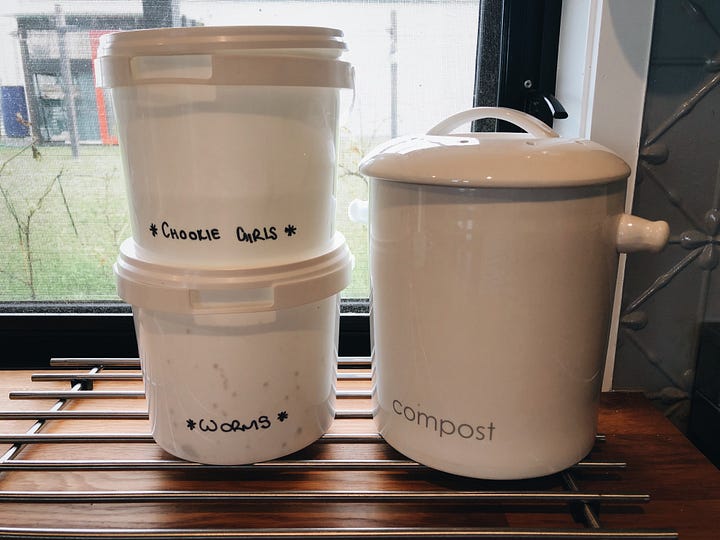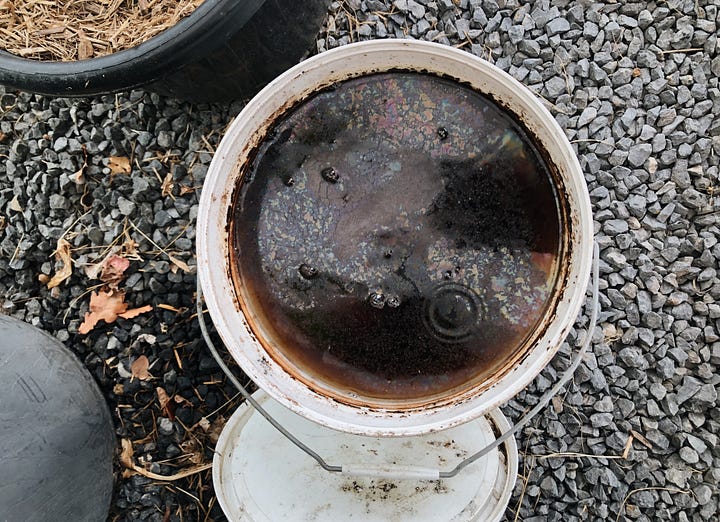

“You don’t have a snail problem. You have a duck deficiency.”
Bill Mollison
If there is one Permaculture Principle that can produce an immediate and tangible impact on the physical environment around us, this would be it.
Did you know that Australian households generate over 12 million tonnes of waste each year, which is roughly 540 kg of waste per person (including kids!)? Organic waste, from kitchens and gardens, makes up around HALF of this, with plastic waste and electronic waste also hefty contributors. While a decent proportion of this is diverted for recycling (a fickle industry with unique challenges), 27% of this still ends up in landfills. As someone with an insider’s view of our local landfill site, I can promise you the speed at which it’s filling is pretty unbelievable.
The whole concept of waste is an inherently human problem - I’m not sure I’ve ever seen a natural system create waste, have you? Modern lifestyles are built on a linear ‘consume and discard’ (input and output) model, with inputs usually coming from both renewable and non-renewable resources. Our culture is consuming and discarding at a rate far exceeding the sustainable limits of our resource base, aka our only planet, and home. We desperately need to shift our thinking to consider not only the sustainability of the inputs we use but the potentiality of the outputs or 'waste' we produce to move from a linear, one-way model to a more circular and low-waste one. While the processing involved in recycling on a commercial scale may utilise non-renewable resources or energy to transform it from 'waste' to 'resource', it's still a less wasteful (pun intended!) way to consume.
Of course, producing no waste in the first place is the best practice here. Bill Mollison (the co-originator of the permaculture concept with David Holmgren) defined a pollutant (or waste) as an output of a system not being used productively. This led to the often-heard permaculture sayings of 'the problem is the solution' and 'you don't have a snail problem, you have a duck deficit!' (so true in my case, really gotta get those ducks).


As a society, we need to decouple our feelings of freedom and comfort from over-consumption.
Governments that need to keep GDP growing, and clever marketing by big companies who want us to keep buying so they can keep driving profits have normalised a throw-away culture to the point of insanity, really. Even the relatively recent buzz around ‘minimalism’ missed the mark in many cases. Instead of the focus sitting with less consumption, we've been told to ‘Marie Kondo’ everything that doesn't spark joy. Don't get me wrong, I love a good declutter as much as the next minimalist does. But waste is waste, no matter what the intention behind it. Switching our mindset to see it as a potential resource and to focus on how we can avoid it in the first place, would go a long way to creating real change at the household level.
Prioritise being thrifty and resourceful
I can't tell you how much satisfaction I get from using something up, wearing something out, up-cycling something, making do with what I have, repurposing, mending and sometimes just doing without. Of course, I am not perfect at this, and often enjoy the benefits of buying exactly what I need, when I need it - it just doesn't have quite the same level of satisfaction attached to it. Cultivating a lifestyle where I take at least some responsibility for the waste I produce (and by trying to avoid creating it where I can) has led to me developing some pretty cool skills and a much deeper sense of self-resiliency, too.


There are so many practical applications of ‘Produce No Waste’ that can be integrated into a permaculture design or lifestyle. Here’s a (non-exhaustive) list of some super-practical low-waste habits and options to reduce your household waste:
Composting and worm farms (of course!)
Keep chickens to turn food scraps into eggs, bug patrollers, funny entertainment (and seedling destruction if you don’t keep them away from that veggie garden)
Produce your own compost tea or weed fertiliser
Dry eggshells and blitz them up into a powder to apply to garden beds or add to compost as an amendment.
Grow from seed and propagate plants from cuttings to avoid accumulating non-recyclable plant pots and seedling punnets - and reuse the ones you’ve already got to grow in. Learn to make paper pots or use cardboard toilet rolls, or save plastic fruit and veg trays and punnets!
Dry the squeezed halves of lemons and oranges to make DIY firelighters
Clean and reuse glass jars over and over instead of fancy pantry containers - and yes, you can freeze in glass (make sure to leave enough headspace in the jar to allow any liquid to expand safely as it freezes)
Avoid using plastic bin liners - just clean out the bin if it gets dirty (or use some unavoidable plastic packaging to wrap up anything mucky that isn’t going to the compost or chooks)
Wash and reuse those sturdy plastic zip locks that frozen berries come in - unaesthetic, but handy
Learn to knit your own dishcloths from cotton yarn and make cleaning cloths out of old sheets and towels. Bonus points for using materials like cotton that can be composted or added to the worm farm at the end of their usable life
Buy household products like laundry powder and soap or pantry staples like pasta in cardboard packaging rather than plastic. Many hard and soft plastics can’t be recycled in household recycling bins
Choose to purchase loose fruit and veg at the supermarket instead of pre-packaged if possible. Another option is to purchase the items on quick sale due to being close to their use-by - this means a bargain for you, and keeps them out of the bin!
Switch from liquid body products like shampoo, hand soap and lotion to bar form - again, many of these products’ plastic containers can’t be recycled. Low-tox alternatives in cardboard can even go in the compost
Experiment with making your own shampoo/soap/lotion/deodorant/toothpaste
Mend and repair clothing and household items as many times as you can before discarding them - try to source replacement parts where you can or visit a repair cafe if you have one near you to keep appliances running
When it is time to buy replacements for things, try secondhand first - this can be in the usual places like Facebook Marketplace or Gumtree, but can also be somewhere like Apple Refurbished for a new-to-you laptop or one of several refurbishers/resellers of phones and other electronics. Retailers may even have floor stock or ‘damaged carton’ sales in your area.
…. the list could go on!
There’s one last consideration for you here, too - where in your life are you wasting your time? Because when we talk about resources, this has got to be the most precious one we have, right? Spending time on things that don’t bring you value or add to your life intentionally (even if they might be something that our culture, society, family or friends value) is still producing waste, in my opinion. (And hey, maybe cutting out some of the stuff you don’t value frees you up to do some of the low-waste living suggestions from the list above!).
I’d love to hear your low-waste habits and thoughts on circularity in the comments - and if you want more ideas, check out all the amazing suggestions to help you go plastic-free by checking out all the resources available for Plastic Free July.



Great ideas. I love the extension of the principle to personal energy and time (although think this may be one of the challenging areas to remove 'waste'). My mind immediately turns to food waste - there are so many clever ways you can use stale bread, off-ish dairy and the entirety of fruits/vegetables. I love the creativity that comes with the challenge. We also use paper bags/packaging etc as for the toddler's drawings/craft (which prevents waste but also means we don't have to buy expensive virgin paper).
I love all of these ideas! I grow luffas in the Summer so I can use them for cleaning in the kitchen and in the bathroom. They are also great for exfoliation. And, they can just be composted when you are finished with them!